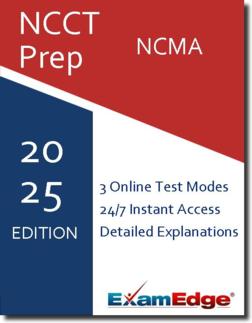NCCT NCMA (NCMA) Practice Tests & Test Prep by Exam Edge - Topics
Based on 28 Reviews
- Real Exam Simulation: Timed questions and matching content build comfort for your NCCT NCMA test day.
- Instant, 24/7 Access: Web-based NCCT Medical Assistant Certification practice exams with no software needed.
- Clear Explanations: Step-by-step answers and explanations for your NCCT exam to strengthen understanding.
- Boosted Confidence: Reduces anxiety and improves test-taking skills to ace your NCCT Medical Assistant Certification (NCMA).

Understanding the exact breakdown of the NCCT Medical Assistant Certification test will help you know what to expect and how to most effectively prepare. The NCCT Medical Assistant Certification has multiple-choice questions The exam will be broken down into the sections below:
| NCCT Medical Assistant Certification Exam Blueprint | ||
|---|---|---|
| Domain Name | % | Number of Questions |
| Anatomy and Physiology | 10-12.5% | 11 |
| Medical Office Management | ||
| General Office Procedures | 10-12.5% | 11 |
| Bookkeeping | 4% | 4 |
| Insurance Processing | 4% | 4 |
| Medical Procedures | ||
| Infection and Exposure Control | 12.5% | 14 |
| Patient Examination (Clinical Skills) | 10-12.5% | 11 |
| Phlebotomy | 10-12.5% | 11 |
| Diagnostic Testing: ECG and other Lab Procedures | 10-12.5% | 11 |
| Medical Terminology | 10-12.5% | 11 |
| Pharmacology | 10-12.5% | 11 |


